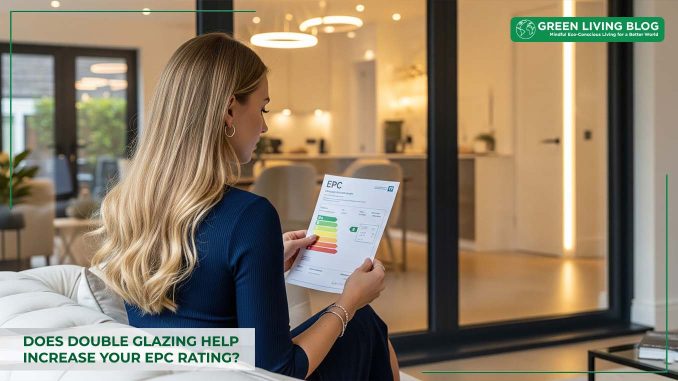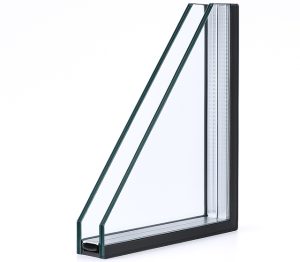
If you’ve ever had an EPC carried out, you’ll know it can have a big impact on your home’s value, mortgage options, and even how much you pay in energy bills.
That’s why more homeowners are looking for ways to improve their rating, and one of the most popular upgrades is double glazing.
But how much of a difference does it really make? And is it worth the investment?
This guide walks you through what you need to know.
Understanding EPC Ratings

An Energy Performance Certificate (EPC) gives your property an energy efficiency rating from A (most efficient) to G (least efficient). It looks at things like insulation, heating systems, lighting and, yes, windows.
You’ll need one if you’re planning to sell or rent your property, but even if you’re not, it’s worth keeping an eye on. A better EPC score means lower bills, a more comfortable home, and potentially a better price if you do decide to move.
The Impact of Double Glazing on your EPC
Double glazing helps to insulate your home by trapping a layer of air (or inert gas) between two panes of glass. This reduces the amount of heat that escapes and helps keep the indoor temperature more stable.
When it comes to your EPC rating, double glazing can typically add 2 to 3 points. That might sound small, but if you’re hovering between a D and a C rating, it could be enough to tip you into the next band – something that could increase your home’s value or make it more appealing to buyers.
It also contributes to other parts of the EPC calculation, like reduced heat loss and improved comfort, which helps your score indirectly, too.
Other Benefits beyond EPC Scores

Even if you’re not chasing a higher EPC rating, double glazing comes with plenty of other perks that make it a smart long-term investment.
- Lower heating bills – Less heat escapes through the windows, so your boiler doesn’t need to work as hard.
- Better sound insulation – Ideal if you live near a busy road or in a built-up area.
- Fewer draughts – Older windows can let in cold air, even when closed.
- Increased property value – Buyers are increasingly aware of energy efficiency.
Plus, well-fitted double glazing can last 20 years or more, so it’s not something you’ll need to replace often.
Costs to consider
For a typical three-bedroom home, replacing all the windows with modern double glazing will roughly cost between £4,000 and £6,000, depending on the size, style, and materials used. It’s not a small investment, but the combination of lower energy bills and increased home value means it often pays for itself over time.
If you’re only able to upgrade a few windows at a time, it’s worth prioritising the largest or draughtiest ones first to get the most benefit.
When Double Glazing isn’t an Option
If you live in a listed building or conservation area, there may be restrictions on what changes you can make to your windows. In these cases, secondary glazing can be a good alternative. It involves adding a second pane of glass to the inside of the existing window, improving insulation without affecting the external appearance.
Always check with your local authority before making changes to protected properties.
Government Support and Future Funding

Upgrading windows or improving insulation isn’t always cheap, but government support may be on the way. Labour has pledged £13.2 billion in grants and low-interest loans over the next five years to help improve energy efficiency in homes, aiming to upgrade five million properties by 2030.
This funding is nearly double what the previous government offered, although it’s scaled back from an earlier £60 billion proposal. For landlords, the party is expected to stick with a £10,000 cap on improvement costs.
If you’re considering improvements, keep an eye on potential grant schemes or financial support like ECO4, HUG2, and more. They could make upgrades like double glazing far more affordable in the near future.
Final Thoughts
So, in short, double glazing might not offer the biggest jump in EPC points, but it can still help with energy efficiency. It also ticks a lot of boxes: better insulation, improved comfort, added value, and increased soundproofing. It’s a long-term upgrade that makes sense both on paper and in everyday life.
![]()
Author Profile

- Eco Warrior by day, Eco Blogger by night trying to get the eco balance right.
Latest entries
 Best practicesFebruary 20, 2026How To Reduce Waste Through Smarter Office Supply Choices
Best practicesFebruary 20, 2026How To Reduce Waste Through Smarter Office Supply Choices Green GuidesNovember 3, 2025The Beginner’s Guide to Making Your Own Nontoxic Candles at Home
Green GuidesNovember 3, 2025The Beginner’s Guide to Making Your Own Nontoxic Candles at Home Green Home GuidesOctober 14, 2025What are Eco-Friendly Tissue Options for Modern UK Homes?
Green Home GuidesOctober 14, 2025What are Eco-Friendly Tissue Options for Modern UK Homes? Best practicesSeptember 17, 20253 Ways Young Families Can Commit to Sustainable Living
Best practicesSeptember 17, 20253 Ways Young Families Can Commit to Sustainable Living





Leave a Reply
You must be logged in to post a comment.